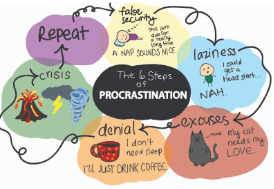The Cons of Procrastination
By Edison Lin
Procrastination. Pushing back work, delaying it, or waiting till the last minute. All of these lead to high levels of anxiety, stress, and poor sleep quality. Many people find themselves pushing back work, only to feel overwhelmed as deadlines loom closer. This pattern can be rooted in various causes, including fear of failure, perfectionism, or a lack of motivation.
Procrastination takes a serious toll on mental health. As unfinished tasks keep piling up, and the deadline gets closer, so does anxiety. All of this leads to a cycle of putting back work, feeling stressed, and then completing it all within one night affecting one’s mental health. Not only does mental health get affected, but so does sleep schedule. The cycle of procrastination creates exhaustion and burnout since everything is done in one sitting as it’s most likely done the day before submission. Over time, this could lower productivity as they’re caught in a cycle of procrastination where they feel overwhelmed and obligated to finish all tasks last minute before it’s due.
The cycle of procrastination I go through (photo courtesy of youronlylifetips.blogspot.com)
I, for example, procrastinated every single assignment last year during my sophomore year. I was super highly stressed especially since I was in the PBAT class for Mohammed & Sancia. On top of that, I had a WWII write-up for history class at the end of the unit. While doing tons of research for history class on a complex topic like WWII, I also had to start finishing up my PBAT. The combination of this work has led to an avalanche of stress that I almost felt nearly impossible to manage. I’ve never turned in my assignments late. However, that means I have to stay up till 1 or 2 am finishing up my assignments because of my procrastination. Additionally, since I’m up that late, the quality of my work also suffers. I had no time to reflect or reread my work as it was late at night and I had school the next day. Reflecting upon it now, I really regretted this decision because I remember that the next day in school, I was really unfocused as I barely got any hours of sleep. I wasn’t able to retain as much information as I normally would and once I got home, I realized that the homework I got wouldn’t make more sense if I was focused during class. The consequences of procrastination go beyond being stressed. When work is rushed, the work being produced often lacks depth and thoughtful ideas. This can result in lower performance, missed information, and disappointment in one’s effort when they get their grade back.
Despite the negative effects of procrastination, overcoming it is not too difficult. Many strategies can help break the cycle of procrastination. Starting with a small, manageable goal can be a way to start assignments/work. For example, I interviewed one of my peers Declan. I asked him two major questions: how does procrastination make you feel and what strategies helped them stop procrastinating? He replied, “I don’t like procrastination because whenever I procrastinate I push everything to the last minute and I lose sleep over it and I don’t realize that I was actually procrastinating until realizing that he's up at 11 pm doing homework instead of sleeping that he would have finished hours ago.” His answer to strategies that helped him procrastinate was to start work early so he could get it out of the way. He set milestone goals for himself where he does this amount of work before the day is over.
Additionally, another way to combat procrastination is installing an app that can also help boost productivity by sending reminders and helping manage time. An app I used is the clock app. Before I set a timer for myself, I tell myself I’m going to reach this checkpoint on my homework. I try my best to reach that goal as I start the timer with either a 10-minute or a 30-minute timer. Making Small Efforts on an assignment with milestones like rewarding yourself is an effective way to combat the cycle of procrastination.
Ultimately, overcoming procrastination is a process. It requires a heavy motivation to start the process of overcoming procrastination. With the willingness to change like consistent action, procrastination will no longer be an issue. Rewards that come along are less stress, anxiety, and better mental health. I always try to reward myself after working on an assignment for really long. However, sometimes I am against this since my brain is already really productive, and watching videos will decrease that productivity, so I take a break by getting water or a small snack. Since there will be no more work as projects get finished before the due date, this allows people to gain the freedom to do whatever they want with their time without having to worry about the burden of unfinished projects. They can also use this time to check back on their work after taking a small break.

